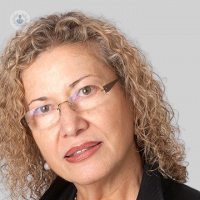How to manage menopausal symptoms
Written by:For women with menopausal symptoms, making a personal, informed decision about beginning HRT, otherwise known as hormone replacement therapy, can be challenging and scary. The duration and initiation of treatment requires careful monitoring. Hormone replacement therapy is, in other words, a form of hormone therapy used to treat symptoms associated with the menopause. We asked Professor Gordana Prelevic, a consultant endocrinologist, to tell us about HRT, the associated risks and alternative therapies.

HRT needs to be individualised
Postmenopausal therapy needs to be individualised because the risks associated with HRT depend on the health of the individual. Preparation for treatment, who should be treated and for how long all depend on factors such as a woman’s age, medical history, family medical history, reasons for treatment and the potential risks and side effects that each woman might face.
What is the gold standard HRT treatment for menopausal symptoms?
Oestrogen therapy is considered the gold standard treatment, effective in 90% of women with hot flushes. Low doses of oestrogen are sufficient to control even the severest of symptoms and are also effective in maintaining bone mass.
Are there risks with hormone replacement therapy?
Any potential risks with hormone replacement therapy are related to dosage, age of a woman and the route of administration of oestrogen (oral or transdermal) . Therefore, the lowest effective oestrogen dose will be used for the shortest amount of time possible. When undergoing HRT, women should be examined annually with the aim to decrease the dose of HRT or discontinue HRT altogether.
Short-term HRT is appropriate for perimenopausal and postmenopausal women, who have moderate to severe vasomotor symptoms (hot flushes and sweats) associated with a lack of oestrogen. Transdermal administration, using gel or a patch is safer, at least in terms of the risk of venous thrombosis.
The risk of breast cancer appears to increase with long-term use of HRT (after four to five years). This risk is significantly greater in women who are on combined (oestrogen and progesterone treatment) than in women who had a hysterectomy and therefore need oestrogen alone.
The risk of a stroke increases in women over the age of 60. HRT with this age group should be discouraged, unless the patient has very severe menopausal symptoms.
Are there alternatives to hormone replacement therapy?
For women who fear the potential risks of HRT, alternatives can be considered. However, there is not sufficient evidence at present to support the clinical use of alternative products and whether “natural” necessarily implies safer and effective treatment. Standardisation of dosage, together with safety and correct and clear labelling is essential when looking into complimentary therapy products.
Lifestyle changes can be just as important as using medication and alternative therapy to control symptoms of the menopause.
- Foods that trigger hot flushes like alcohol, spicy food and hot drinks should be avoided.
- Regular exercise can reduce hot flushes and has other benefits in improving quality of life. It can help women normalise weight and also prevent postmenopausal bone loss.
- Both acupuncture and the use of trained relaxation techniques on a daily basis have shown significant benefits in controlling hot flushes.
For more information about treating symptoms of the menopause with HRT, make an appointment with a consultant endocrinologist like Professor Gordana Prelevic.


